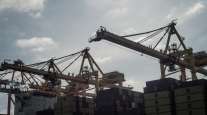Senior Reporter
Chinese Truck Tires, Intermodal Chassis Have Higher Tariffs

Buried in a long list of Chinese exports subject to new U.S. tariffs are truck tires — including retreads — as well as chassis. They face sanctions alongside thousands of diverse items like seafood, chemicals, and baseball and softball gloves and mitts.
A 10% tariff on the listed items took effect Sept. 24, and will rise to 25% on Jan. 1 if no resolution is reached.
“We will look to do whatever we can to sustain our business,” said Trevor Ash, vice president of sales at CIMC Intermodal Equipment. “Obviously the 10% tariff is something, based on the feedback that we have gotten from our customers, that we can hopefully overcome.”

A CIMC low bed truck chassis. (Qingdao CIMC Special Vehicles Co. Ltd.)
Beijing-based CIMC is the world’s largest manufacturer of intermodal container chassis. It manufactures in China and completes assembly and pre-delivery at its locations in the United States.
“It is not going to just affect us as one manufacturer. It is going to affect a lot of people in our industry — chassis-pool providers, fleets, our dealership network, end-users and some of our competitors because they source Chinese components,” Ash said.
Higher costs will move throughout the supply chain, he said. “The container chassis market is a very competitive market. It is very tough to absorb any tariff. Obviously, 10% is stage one. If we get to 25%, it will require a different approach.”
The Office of the U.S. Trade Representative imposed $200 billion of tariffs “as part of the United States’ continuing response to China’s theft of American intellectual property and forced transfer of American technology,” according to a statement it issued.
In all, the list contains 5,745 full or partial lines of the original 6,031 tariff lines that were on a proposed list of Chinese imports announced on July 10.
One tire industry expert said the tariffs on truck tires did not go far enough.
RELATED: China Announces Tariff Cut, Stays Silent on US Technology Complaints
“It will try to level the playing field, but it is really not enough compared with the amount of support the manufacturers and producers in China must be getting to make these things where they sell them, in some cases, below the cost of the raw materials,” said Norman Ball, principal at Ball Tire Industry Consultants, based in Kansas City, Mo.
That’s a money-losing proposition, he added, “unless you have a government behind you that is bankrolling you.”
China exports more truck tires to the U.S. than any other country, said Ball, and estimated it made up “well over 30%, probably” of the market.
Typically, these tires cannot be retreaded due to their lower workmanship. At their lower initial cost that doesn’t matter to some buyers, but this has hurt business in the retreading industry, experts said.
“A tariff is a blunt instrument. We would much rather see the quality of all the tires be raised to a certain level so that they all could be retreaded,” said David Stevens, managing director of the Tire Retread & Repair Information Bureau in Falls Church, Va.
Chris Chase, president of Donald B. Rice Tire Co. in Frederick, Md., said the price of tires will go up as a result of the new tariffs.
“Manufacturers want to keep a spread,” he said. “So if you are a domestic manufacturer, or from anywhere outside of China — if Chinese tires go up 10% and you were already 10% above them, then you are going to want to keep that. We will see price creep.”
But it may not happen immediately, he said.
“We are not sure how it is all going to shake out,” he said. “It could be 25% in January. Or with this administration, and the way things go, it could take a turn and back off.”




